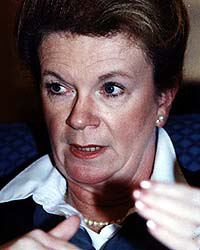Helen Liddell in the Press
 HM Government Health Warning 'Dinnae take drugs or ye could end up talking as much crap as I dae'.
Sign the Helen Liddell Guestbook
 This page has been visited
 Home |

Teachers see Liddell as hostileBy ELIZABETH BUIE Education CorrespondentONE of Scotland's most senior commentators on educational policy will tell a conference of Edinburgh headteachers today that Mrs Helen Liddell, the Scottish Education Minister, has "inexplicably allowed herself to be portrayed as aggressively hostile to teachers".Her stance has "unnecessarily alienated teachers and distracted attention from some of the truly radical ideas in Labour's recent White Paper on Scottish Education", Lindsay Paterson, professor of educational policy at Edinburgh University, will tell the Aiming High 99 conference. The White Paper is radical in the sense that the Government is taking forward the principle of comprehensive education, rather than questioning it, Professor Paterson believes. "But it has to be said that the political rhetoric does not always match the stated aims," he adds. He will also warn that reform can only be achieved through working in partnership with teachers and education authorities and that the last politician who failed to realise this was Mr Michael Forsyth "whose attempts to impose change in the late 1980s were disastrous for him, his party and the education system". Professor Paterson goes on to say that the Scottish Parliament will be founded on the principle that consultation and consensus are better than imposed reforms, but that the implications of that way of working have not yet impinged on much of our public debate. His comments come in the wake of Mrs Liddell and the EIS teaching union engaging in a public slanging match over the White Paper. Mr Ronnie Smith, general secretary of the EIS, described the paper as "a missed opportunity" and claimed it copied the English model too closely; she attacked the union for behaving like "1980s dinosaurs" and for making "ill-informed" criticisms of the Government's plans. The Scottish National Party has also consistently accused Mrs Liddell of "teacher-bashing". Observers have suggested various reasons why Mrs Liddell should be perceived as "anti-teacher". One is that she has tried to adopt Education Secretary David Blunkett's agenda without realising that Scottish schools inspectors have tended to operate far more of a partnership approach. Another view is that her stance is partly a public stance to indicate to her political colleagues down south that Labour's education policy is not that different in Scotland to England, although in fact, as the White Paper suggests, it is radically different in many areas. A third theory is that the White Paper was in fact largely the work of her inspectors, and that Mrs Liddell did not like it but could not over-rule them as she will be returning to Westminster in a few months. Professor Paterson is among those who believe there are important areas in the White Paper which mark out Scottish education quite radically from the English agenda: the partnership approach of the inspectorate; new community schools; the different nature of a target-setting framework as a means of monitoring schools' performance; the emphasis on early intervention; and social policy on widening access to higher education. He will also tell the conference that despite recent headlines about a "crisis" in Scottish education following the HMI report on standards in schools, he does not believe these claims to be borne out by careful analysis of what has actually happened. Some of the achievements of Scottish education include, according to Professor Paterson: enormous expansion achieved at constant rates of investment; successes in comprehensive secondary schools, particularly in years S3-S6, in examination results and reducing social class differences in access to schooling; a revolution in girls' attainment; and the success of mixed-ability classes at least up to the age of 14. He will add: "Change can be achieved only by working with teachers and education authorities. This point is not an ideological or even a moral one, but is rather to do with effectiveness: all the research evidence shows that, to achieve real change, policy-makers have to work with the system, not against it." - Feb 3
|
